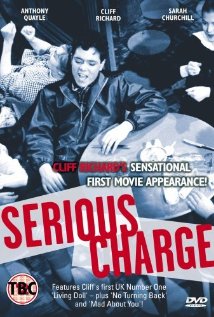
SERIOUS CHARGE
UK, 1959, 99 minutes, Black and white.
Anthony Quayle, Sarah Churchill, Andrew Ray, Irene Browne, Percy Herbert, Noel Howlett, Judith Furse, Wilfrid Brambell, Cliff Richard, Liliane Brousse.
Directed by Terence Young.
A small budget film from 1959, is Serious Charge. This is several decades before abuse in churches and institutions came to public attention.
The setting is Anglican, with married clergy. In this film, the priest is falsely accused of ‘interference’, a more restrained use of words for the period. Anthony Quayle portrays the priest, new to the parish, interested in youth work, but encountering that kind of youth rebellion from the late 1950s. He accuses a teenager who thinks himself superior to others of being the cause of the death of a girl whom he had got pregnant. He invites the young man to the Rectory to confront him and force a confession, but the young man turns the tables, smashes and trashes the room, tears his shirt open, just as an older woman from the parish, who is in love with the priest, comes in and the young man makes an appeal to her, accusing the priest. The consequences are that the parish turns against the priest, protests and hatred, poison letters.
However, the woman comes to realise the truth, sets up a parallel framework in her house, inviting the young man, explaining how she could frame him for assault. However, the priest feels that he is driven from the parish, but his common-sensed mother takes things in hand, persuade him to stay, and hopes for a happy marriage.
This was an unusual theme for the 1950s – but, according to a century later, the accusations against the priests will not be false but true.
The film was directed by Terence Young, who directed some solid British dramas in the 1950s but was to move to more international films, especially with the James Bond films, Dr No and From Russia With Love.
1. A film of 1959? Britain? Themes: the young, rebellion, the role of the church, relationships, false accusations?
2. The town setting, homes, the Rectory, clubs, the courts?
3. The musical score, Cliff Richard and the songs?
4. The title, the focus on Howard Phillips, Larry Thompson, the sexual setup, accusation, misconduct, interference? The reputation of the clergy? Consequences?
5. Howard Phillips, his arrival, his background, working with youth, his role in the church, taking over from the old vicar? The outreach to youth in the town? The clubs? His presence, the music, his tolerance, his concerns? The young men and women? Concern about Mary, her situation, pregnancy? Michelle and her presence in the Rectory, getting her to do jobs?
6. Phillips and his character, not married, Hester and her wanting to marry, her approach, his not responding, the presence of Michelle in the house, undertones of homosexuality, not a topic for the public or films in 1959?
7. The use of the club, the music, dance, Curley and his songs, popularity? No Turning Back, Living Doll.…? Cliff Richard and his age, introduced in the film? His character, younger brother, relationship with his father, with the girls, in court, the hearing, probation? Howard Phillips support?
8. The members of the judiciary, the probation officer, Larry and his insults?
9. Phillips and his concern about Mary, her situation, the maid saying she saw Mary with Larry, her death, at home, the setup, accusing Larry, describing the situation, demanding his admission? Accosted by Larry, Larry and his response, smashing things, opening his shirt, Hester arriving, his pleading with her, the accusation of interference, Hester believing Larry?
10. Larry’s character, his home background, the place of his father, relationship with Curley, the friends at the club, his hard stances, relationship with Mary, getting her pregnant, not knowing? Flirting with Michelle in the club? Mary wanting to tell him the truth? Mary seeing them together, shock, out on the road, her death? Larry and his help, the ambulance? A man who could not care, fill himself superior? The quick thinking in framing Phillips? The appeal to Hester? His presence at the funeral? Curley in court? Hester inviting him, the discussions, the parallels, alone, the setup, the possibility of framing him, Hester smashing things? His being unmasked? The arrivals, his father and the police?
11. Hester and her father, his moving out of the Rectory? Hester unmarried, the attraction to Howard, his not responding, her presence in the club, coming in and finding Larry? The effect? In the parish? Her change of heart, Howard’s mother, the discussions? The setup to trap Larry? Howard packing, his mother wanting him, Hester to marry him?
12. The role of the police, Mr Thompson – and their arrival and apology to Howard?
13. The place of the church, the parish, the warden, the various letters, against Howard, the hostility, his being driven out?
14. His mother, strong character, the packing, encouraging Hester?
15. The future?